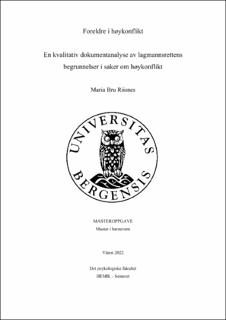Foreldre i høykonflikt - En kvalitativ dokumentanalyse av lagmannsrettens begrunnelser i saker om høykonflikt
Master thesis
Permanent lenke
https://hdl.handle.net/11250/3000916Utgivelsesdato
2022-05-19Metadata
Vis full innførselSamlinger
- Master theses [157]
Sammendrag
Foreldrekonflikt kan ha alvorlige konsekvenser for barn, både ved samlivsbrudd og langvarig konflikt om foreldreansvar og samvær etter brudd. Dette ses blant annet i form av atferdsproblemer, tilpasningsvansker og andre psykiske og fysiske plager. Studiens formål har vært å belyse hvordan lagmannsretten begrunner spørsmål om foreldreansvar og samvær i saker om høykonflikt og tar for seg barnets rett til å bli hørt samt barnets beste og om dette blir ivaretatt i lagmannsrettens begrunnelser. Studien undersøkte hva lagmannsretten legger til grunn i saker som omhandler vold i hjemmet og om foreldrenes psyke står som hinder i disse spørsmålene. Studiens hensikt var videre å undersøke om det var identifisert risikofaktorer hos barna av foreldre i høykonflikt. Metoden som er benyttet i denne studien er kvalitativ dokumentanalyse av 15 rettsdokumenter fra lagmannsrettens, fra årene 2018–2021, hvor rettens begrunnelser om foreldreansvar og samvær er analysens fokus. Den analytiske metoden som er valgt for studien er tematisk analyse. Studien fant et tydelig fokus på barnets beste i lagmannsrettens beslutninger og at foreldrenes høykonflikt ble sett i sammenheng med om de var i stand til å samarbeide om foreldreansvaret. Studiens funn tyder videre på at de fleste barna vises å utvikle en form for psykisk eller fysisk konsekvens som følge av foreldrenes høykonflikt og at langvarig konflikt, sammen med andre risikofaktorer, utgjør større sannsynlighet for at barnet utvikler problemer, eksempelvis dersom foreldrene står i en høykonflikt og i tillegg misbruker rus, eller utøver vold. Parental conflict can have serious consequences for children, which can be seen both by change in family structure and marital breakdown. This can be shown in the form of behavioral problems, adaption difficulties and other mental and physical conditions. The purpose of the study has been to study how the Court of Appeal reason the question of parental responsibility and the child’s right of access to the parents in the high conflict cases, by addressing the child’s right to be heard and the child’s best interest, and whether this is considered in the grounds of the court. Furthermore, the study examines what the court base their judgement on in the cases involving domestic violence, and whether the parents psyche stands as an obstacle in these questions, and possible risk factors that had been identified in the children of parents in high conflict cases. The study’s method is qualitative document analysis of 15 court documents from the years 2018-2021, where the courts justifications are the focus of the analysis. The analytical method chosen for the study is thematic analysis. The study found a clear focus on the child's best interests in the Court of Appeal's decisions and that the parents' high conflict was seen in connection with their ability to cooperate on parental responsibility. The study's findings indicate that most children are shown to develop a form of mental or physical consequence as a result of the parents' high conflict and that long-term conflict, together with other risk factors, is more likely for the child to develop problems.
